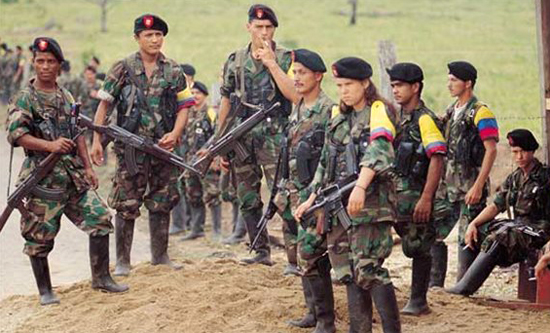
On 22 May FARC suspended its current ceasefire after yet another attack by Colombian state forces the previous day that killed 27 revolutionaries at a cost of at least 10 government forces. This included Jairo Martinez, a negotiator at the Havana talks, who had returned to report the state of the peace discussions with his comrades. President Santos called this a ‘legitimate action’. The 36th round of discussions in Havana between FARC and the Colombian state representatives had only just been completed in mid-May. FARC persisted with the next round starting 25 May, despite the killing of another FARC commander, Roma Ruiz, that day. FARC representative Pablo Catatumbo stated that ‘We’ll proceed with cool heads and ardent hearts, we cannot throw away our determined efforts in more than three years of talks.’
Violence of the state
FARC declared and patiently maintained a ceasefire from December 2014. This is the third and longest ceasefire declared by it since 2012, all without reciprocation from the state. 360 days of negotiations have taken place since 2012, despite the continuation of highly provocative armed assaults and killings of FARC troops and senior leaders by state forces.
Throughout the negotiations FARC forces have been constantly attacked by state forces on the ground and from the air. On 14 April the Apollo Task Force lost 11 men when FARC was forced to defend itself. President Santos continues to send in troops to kill and be killed in a senseless bloodletting that FARC tries to prevent by political means. Whilst the talks between the parties in Havana continued after the 14 April battle, the aerial bombing of FARC positions, which Santos had just suspended in the face of pressure by European and UN politicians, was immediately resumed.
Repeated assaults aim to weaken FARC on the ground and so in negotiations. The Colombian ruling class’s cynical use of violence has seen some five million people displaced, and a quarter of a million killed during 55 years of war aimed at clearing and seizing the land, and crushing all resistance to super-exploitation of the working class.
On 23 May another attack killed seven FARC soldiers in Antioquia province, part of a force commanded by communist leader ‘Pastor’ Alape, one of the chief envoys to peace talks.
Chequered developments
The struggles by organised labour, workers and poor peasants and pressure from humanitarian and liberal activists, on top of demands from Colombian and international businesses for a stable and profitable environment, have driven Santos’s search for a peace tolerable to his class. He knows he cannot defeat FARC or smaller groups like the ELN, so he seeks to weaken and then disperse them. Thus any step towards peace is always accompanied by military attacks and new political and legal obstacles.
On May 13 FARC had again urged the government to include the smaller ELN guerrilla group in peace talks, and President Santos finally facilitated a meeting between the leaders of FARC and the ELN. Already a pilot programme in which Colombian military and FARC members are together clearing mines from conflict zones, is in operation.
However any steps towards peace disturb the war profiteers, whether US or Colombian. Sections of the armed forces are anxious to maintain the conflict. They fear further criminal exposure if the demand by FARC for the opening of the state and army archives to the Historical Commission for the Conflict and its Victims (CHCV) is conceded. Yet without this, full reparation for the victims of state terror cannot be completed. To what is already known will be added an avalanche of new revelations – and the truth is revolutionary. President Santos, when Minister of Defence, signed Directive 029 providing bonuses for killing FARC members, which lead to thousands of unemployed youth being murdered and reported as dead guerrillas so that his officials could take the bonuses.
FARC’s demands – the demilitarisation of society; abandonment of the doctrine of ‘National Security’ against the ‘enemy within’, and a clean-up and reduction in the number of the police and armed forces – are clearly a threat to the Colombian police and military. FARC also demands the dismantling of state-sponsored paramilitary organisations, funded by the drugs trade. In the past these organisations have systematically butchered leaders of the revolutionary left after political agreements. The continued provocative assaults and killings of FARC troops under truce also came at a time when key political questions are on the Havana agenda. What will be the future role of the present FARC leadership, including those members incarcerated in US prisons? FARC cannot agree to the imprisonment of its own soldiers, who voluntarily took up arms to defend their land from thieving landlords and their homes and families from destruction by landowners’ paramilitaries.
How will rural reform be achieved when the government is now trying to change the law to impose ‘Zones of economic and rural development’ (ZIDRES) which would block the rights of exploitation of uncultivated land by landless peasants? The government now proposes to break up family farms (legally ‘Unidades Agrícolas Familiares’ currently protected by a law of 1994) so as to hand the territories over to large landlords and international capital. The agricultural programme of the FARC is central to its negotiating position.
Alvaro Michaels
British Petroleum
The current claim for damages in the London High Court against BP by Gilberto Torres, a Colombian trade union leader, is the most recent case to seize the headlines in Britain. Kidnapped and tortured in 2002 by paramilitaries, he is one of only two trade unionists kidnapped in 30 years to have survived. His torturers have since claimed they were paid to protect BP and other multinational oil company pipelines. The plunder of Colombia’s resources to profit the wealthiest social classes of imperialist countries is at the heart of the ongoing tragedy.
Fight Racism! Fight Imperialism! 245 June/July 2015




